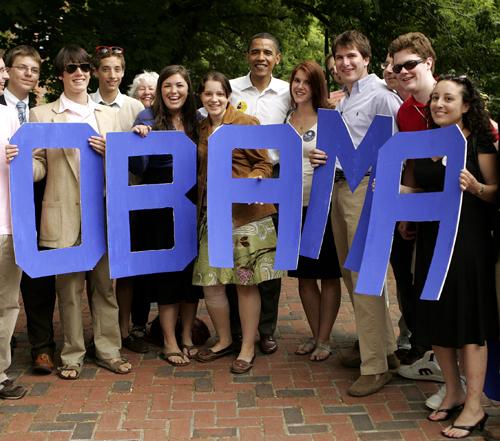Students help Obama gain donations

Democratic presidential hopeful Sen Barack Obama of Illinois poses with supporters during a campaign stop in Laconia, N.H., Monday, July 2, 2007. Jim Cole, The Associated Press
Jul 9, 2007
Last updated on May 12, 2016 at 01:20 p.m.
Presidential candidate Barack Obama, D-Ill., recently raised $32.5 million in the second fundraising quarter, setting the record for the most money raised in one quarter by a Democratic candidate.
According to Associated Press reports, this puts Obama ahead of his top rival, Hillary Clinton, who is expected to have raised between $21-27 million during the second quarter, which ended June 30. Republican frontrunners Rudy Giuliani and Mitt Romney raised $17 million and $14 million, respectively, in the second quarter.
“Senator Obama’s campaign is historic in the sense that he has so many people enthusiastic and inspired to get involved,” said Famid Sinha, National Communications Director of Students for Barack Obama.
Sinha is a senior at the University of Pennsylvania.
Get The Daily Illini in your inbox!
During the second quarter, 258,000 donors contributed to the Obama campaign and 90 percent of these funds came from donations of less than $100.
“When you talk about these small donations, you have just average Americans, not your lobbyists or political action committees in Washington,” Sinha said.
Students from across the nation have become increasingly involved with funding the senator’s campaign. Students for Barack Obama originally began as an independent organization but was later adopted by Senator Obama’s campaign. The student-run organization focuses on getting students active in politics, as well as fundraising for the campaign.
“Our inclusion in the campaign has a greater theme, which is not necessarily tapping into voting blocs, but rather trying to get Americans involved in politics again, trying to engage them, trying to let them know that we do matter, and that we are a part of the process,” Sinha said.
The UIUC chapter of Students for Barack Obama has set up a fundraising Web site in which students are able to give donations that fit their budgets. All donors are then recognized through a list on the site.
So far, about 45 students have pledged money totaling $1,300 to the campaign through this Web site, which has been available since Spring semester.
Andrew Robinson, senior in LAS and president of the UIUC chapter, said the organization’s goal is to raise $13,000 by the time of the Iowa Caucus on Jan. 14, 2008.
“This was Senator Obama’s starting salary as a community organizer, so we thought that would be a fun goal to try and reach,” Robinson said.
The Web site emphasizes recognition for contributions, allowing for even the smallest donations to be publicly acknowledged.
“A lot of times, unless you give big dollar donations, you really are kind of lost in the shuffle of these national campaigns,” Robinson said.
Magen Ryan, Illinois Coordinator of Students for Barack Obama and a senior at Illinois State University, said many chapters at different universities have begun setting up “Obama mini-stores” on campus. These stores sell campaign merchandise at a reduced cost for students. All proceeds from the merchandise are direct contributions to the campaign, said Ryan.
Ryan explained that Sen. Obama is also focusing on many low-dollar campaign events. One of these events, Generation Barack Obama, was held on June 8 at Union Station in Chicago. Obama and his wife Michelle both spoke at this event, as well as Emmy Award-winning actor Jeremy Piven. The event was held on a Friday night at 9 p.m. The cost was $15 for students, and $20 for adults.
“Instead of doing high-dollar fundraisers where it’s like $1,000 or $2,300 to get in, he’s doing many low-dollar events where often times there are reduced prices for students,” Ryan said.
The campaign’s focus on small donations, grassroots support and the power of the average citizen encourage more young Americans to become engaged in politics and government, regardless of political views and party affiliation.
“We can no longer just kind of sit back and stomp our feet and say that we don’t respect our leaders. At some point, we have to stand up, and we have to take a stand and try to influence the system,” said Sinha.





